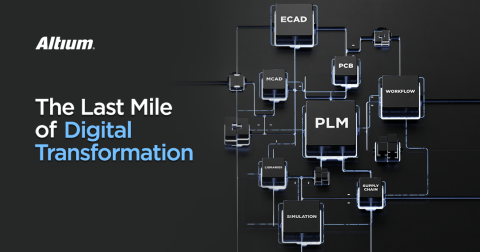Startups Are Well-Positioned for ECAD Digitalization

In today's business age, implementing a transformative digitalization strategy is one of the big keys to a company's ongoing and future success. By adopting and integrating digital platforms, smart applications, and managed services, businesses can transform business processes and product development.
Why Startups Should Embrace Digitalization
Digitalization allows companies to quickly adapt to changing market dynamics and customer expectations while improving overall business efficiency, enhancing product development, and fostering innovation and new opportunities.
Implementing a transformative digitalization strategy is very time-consuming for mature enterprise organizations. Changing established processes also creates a significant disruption to ongoing operations. In contrast, startups have a unique advantage over established companies because they are just beginning to develop their business and development processes.
Startups are not weighed down by deeply entrenched business practices and cultural habits. For startups, embracing a digitalization strategy and establishing digital technologies and processes is an opportunity to do it right from the beginning.
When their existing PCB tools were not a good fit for digital integration, LeoLabs looked to Altium.
And if startups needed more reason to institute a digitization strategy, research conducted by MIT Sloan Management found that the most digitally mature companies are 26% more profitable and generate 9% more revenue than companies without digital strategies.
Researchers also found that adopting digital products and services has become increasingly complex, “with a new wave of technological and competitive possibilities arriving before many companies mastered the first''. Meaning, that for startups, there is a tangible benefit to implementing and optimizing digital processes from the start and avoiding the pain of adapting and transforming later on.
Leveraging Digital Know-How
Excitingly, new startups designing electronics products have significantly more options and much easier access to digital technologies and platforms compared to just five or ten years ago.
But many successful, digitally mature companies have learned a critical lesson: digitalization is NOT about running out and getting the "newest and shiniest" digital products or services. Literally, anyone can buy digital products, throw them into the mix, so to speak, and then sit back and wait for fantastic results.
Unfortunately, just purchasing digital products will not magically create any useful digitization strategy and certainly not a best-in-class one. Investing in digital products or services is great.
Having a solid strategy and the corporate will to implement new technologies is critical. But the key to successful adoption - either as a startup or veteran business - is all about the people. Businesses must develop a clear understanding of how people will use digital processes and platforms in the execution of their jobs.
Fortunately, startups have a huge advantage when it comes to innovation and digitalization. In addition to having more options and easier access to digital technologies, they also have access to a growing pool of knowledgeable professionals who have participated in digital initiatives before.
Brian Clark, an experienced RF design engineer, is one such professional. He joined the electronics design team at LeoLabs, a startup that provides commercial radar tracking services for objects in Low Earth Orbit. Brian's previous experience with digital technologies has been invaluable to the company.
- Brian Clark, RF Engineer, Leolabs
The LeoLabs ECAD organization was typical for a relatively new startup. The existing processes lacked digital integration, and there was little focus on creating consistent experiences across the multiple applications in use. Brian described the ECAD environment as “confusing” and a bit “scattered.” Engineers seemed to be doing their own thing and the disconnected processes led to significant duplication of effort, especially for PCB libraries and data management.
LeoLabs: Well-Positioned for ECAD Digitalization
Leveraging Brian’s experience, the LeoLabs team set out to modernize their ECAD organization by implementing Product Lifecycle Management and digitally integrated applications and processes. As Brian pointed out, “We needed to release BOMs quickly and accurately, make changes to existing released products, track revisions, and have a consistent component library.
We also needed an automated way to manage our ECAD library, supply chain availability, and vendor contact records.”
The team took a close look at their existing PCB point tools and available PLM solutions in order to determine the best way to implement a digitally integrated design solution that met all of their goals. When they determined their existing PCB tools were not a good fit for their long-term digital integration goals, LeoLabs looked to Altium.
Choosing Altium Enterprise Solutions
LeoLab’s first task was to find an engineering-centric and product-centric PLM environment that would digitally connect design, quality assurance, and product development data and processes. A PLM solution would represent a single source of truth and help the team comply with best practices, keep track of and fulfill regulatory compliance requirements, and overall help streamline product development.
The Altium enterprise solutions provided the LeoLabs ECAD team with a digitally integrated, enterprise-level electronics design environment that seamlessly connected their chosen PLM directly with its PCB design applications. Additionally, by extending the digital integration across multiple design domains such as mechanical and simulation, engineers from various disciplines could see all of the design data for their product development process in one place without having to learn or switch between multiple interfaces.
Altium ties together all elements of the electronics development enterprise and its data. It's enterprise solutions are unique solutions that acts as a hub for enterprise team member collaboration associated with the entire PCB design process including configurable process workflows, team assignments, component and design lifecycle management, version/revision control, ECAD-MCAD collaboration, automated design reviews with team notifications, and PLM integration. Learn more about the Altium digitally integrated, enterprise-level electronics design environment.
Connecting entire organizations and teams, from PCB designers and mechanical engineers to project managers, component librarians, procurement, and manufacturers—allows all the extended team members to actively engage throughout the entire design process.
PCB workflow management and configurable processes help to capture existing processes and company best practices, providing a fully integrated solution that supports unique business requirements.
- Design and data management activities directly within the PCB design environment
- Manage part and design lifecycle information
- Synchronize part metadata between PCB design and PLM
- Integrated ECAD-MCAD collaboration workflow
- Enterprise team collaboration and status tracking
Altium empowers startups to proactively address both the complexities and inefficiencies of design operations and processes for a growing electronics design organization by providing the foundation to implement the seamless digitization, integration, and management of product development processes.
Are You Ready to Digitalize Your ECAD?
Digital technologies and platforms offer startups numerous benefits in terms of streamlining and standardizing design applications and development processes. By proactively integrating these technologies into their workflow, startups can realize these benefits quickly.
The Altium enterprise solutions enable a new level of digital continuity, transparency, and access empowering organizations and teams with the information they need to address project challenges and make decisions at the critical points of impact – when they matter most. As the most lightweight, easy-to-implement electronics design solution for enterprise organizations of all sizes or maturity, Altium makes ECAD digitalization not only possible but easy.
Built on the same powerful, customer-centric PCB design foundation of Altium Designer® – the world’s most popular PCB design software – Altium is transforming electronics design.





